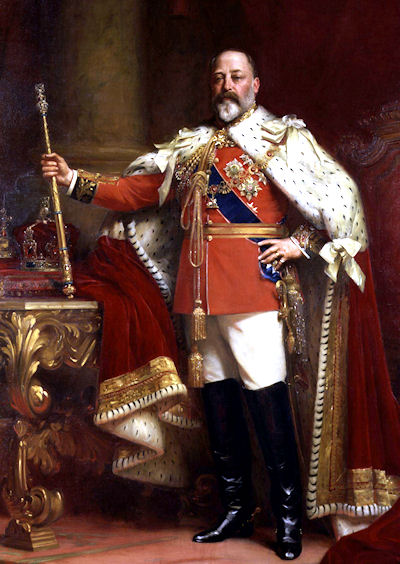Edward the Peacemaker
 The success of King Edward as a promoter of international friendliness, and the advantage of so efficient a type of kingship, attracted universal attention, and treaties of arbitration were concluded by Great Britain with France, Spain, Italy, Germany and Portugal in 1903 and 1904. In his first two years the king had already earned the title of Edward the Peacemaker, and established his position as a source of new strength to the state. This reputation was confirmed in the years which followed, during which the royal hand was to be seen in the progress of foreign affairs in a manner somewhat new to old-fashioned politicians.
The success of King Edward as a promoter of international friendliness, and the advantage of so efficient a type of kingship, attracted universal attention, and treaties of arbitration were concluded by Great Britain with France, Spain, Italy, Germany and Portugal in 1903 and 1904. In his first two years the king had already earned the title of Edward the Peacemaker, and established his position as a source of new strength to the state. This reputation was confirmed in the years which followed, during which the royal hand was to be seen in the progress of foreign affairs in a manner somewhat new to old-fashioned politicians.
The entente with France was promoted by his influence, notably by his reception of President Fallieres in England in 1908. It was noticed that the permanent undersecretary for foreign affairs, Sir Charles Hardinge, generally accompanied the king, as one of his suite, on his visits abroad: and the conclusion of the Anglo-Russian agreement (1907) which was attributed with some reason to royal policy was hotly criticized in Radical quarters. It was pointed out that neither the foreign secretary (Sir E. Grey) nor any other secretary of state accompanied the king on his foreign visits. These objections were, however, scouted by the government, and undeniably public opinion approved of the sovereign's personal activity in a sphere peculiarly his own.
The strengthening of British influence in Europe, which was the marked result of the Anglo-French and Anglo-Russian ententes, and of the closer ties between England and countries like Portugal and Spain (whose young king Alfonso married Princess Ena of Battenberg, King Edward's niece), had the effect of rousing German suspicion, the view taken being that the object of British foreign policy was to isolate Germany; and during 1907 and 1908 the political situation was colored by the discussions in the press with regard to Anglo-German rivalry.
In February 1909 the king and queen paid a state visit to the Kaiser in Berlin, where the greatest cordiality was displayed on all sides; the event was prepared for, in both countries, as a means of dispelling the clouds which had gathered over the relations between England and Germany, and the success of the visit proved once more how powerful King Edward's personality could be as an agency for peace and international amity.
"The King was not a dexterous diplomatist, but he was a great monarch" was the opinion of Lord Balfour. Aware of the dangers of war in Europe, he set out to strengthen his country's position on the continent. Although in some ways he had launched the Foreign Office on an adventurous course by the two ententes for which he was primarily responsible, that with France about Morocco and that with Russia about Persia, his influence with the Government had been a steadying one, and it is probable that if he had lived another ten years the supreme catastrophe of a European war would have been avoided. He knew what was going on in the various Courts of Europe far better than did professional British diplomatists, and his disappearance from their counsels left the supreme direction of British foreign policy uncontrolled in the hands of the Minister of Foreign Affairs, Sir Edward Grey, whose ignorance of foreign affairs was really astonishing, knowing as he did no foreign language, and having made hardly so much as a holiday tour in Europe.
|
NEWSLETTER
|
| Join the GlobalSecurity.org mailing list |
|
|
|

